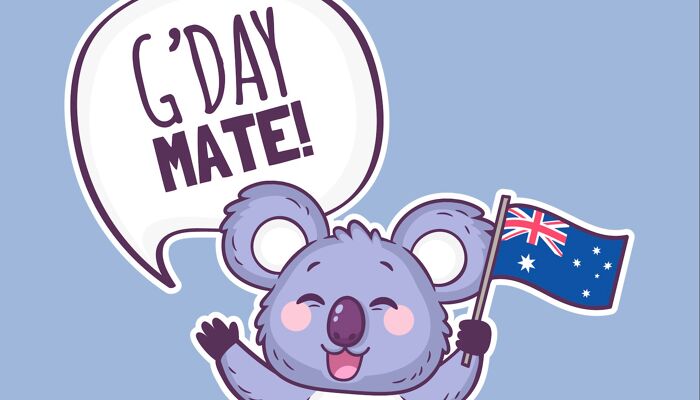My very gay investigation of Australian slang (with a little help from an AI)

G’day, mate!
My husband Brent and I are currently living Down Under in Sydney, Australia. This is Brent’s first trip to the sunburnt country, but I’ve lived here twice, once in my twenties and once as a high school exchange student.
Related:
My mom’s gay best friend was a boisterous, chain-smoking alcoholic. He taught me so much.
There are almost eight billion people on the planet — and there are exactly that many different ways to live.
Before we start, I reckon we oughta have a chinwag about lingo, because while Aussie’s technically jibber jabber in English, it’s defo not the same language that flaming galahs like you and me use.
Never Miss a Beat
Subscribe to our daily newsletter to stay ahead of the latest LGBTQ+ political news and insights.
Don’t worry if you have no idea what I just said because I’m here to teach you the basics of Aussie slang. I’ll also explain why they love shortening words so much.
I do know how confusing it can be. My first time here, I quickly realized how differently Aussie’s talk. I was especially taken aback by all the unfamiliar words. Chook? Dunny? Sunnies? Plus, there was that thick Aussie accent.
Or was I the one with the accent? That’s what all my new Aussie friends thought.
According to them, I sounded like this: “Hiiiiii, my naaaaaame is Miiiiiichael and I’m from Americaaaaaaaa.”
I don’t have many good pictures from my time as an exchange student, so I used Microsoft’s Bing AI image generator to come up with something that might illustrate how strange they thought I was.

I definitely didn’t look like this Netflix version of a teenager. I was too tall and chubby and didn’t walk with a swagger like I was starring in some male version of Emily in Paris called Cedric in Sydney (I did ask Bing to create some images with an overweight kid, but what I got back was pretty fat-phobic and offensive, so I didn’t use them. I’m not sure if this says more about Microsoft or society).
Anyway, I’m back in Australia again, and I’ve been meeting up with many of my friends from that high school exchange program all those years ago. I have pictures of us hanging out together, and could simply show them to you.
But let’s see what Bing’s AI image generator comes up with instead:

I’m not as hot as these men either, but thanks, Bing! But why is the man on the right shirtless? Does Bing know I’m gay and is trying to pander to me? And what’s with the disembodied hand on his left shoulder? Only slightly less creepy is the woman in the hat and her zombie eyes.
Anyway, back to the topic at hand — Australian slang.
Aussies are famous for shortening words. They even shortened Australia to just Straya. And they don’t speak Australian, they speak Strine.
When I asked one of my old friends why they did this, he laughed and said, “By the time we get to the end of a word, we’re done. Am I gonna pronounce that ‘r’ on the end of that word? Why would ya?”
Which is just a fantastic quote, isn’t it? Once he said that, I knew I had no choice but to write this article.
Here are a few other examples of words Aussies have shortened:
- Christmas present = Chrissy prezzie
- Brisbane = Brissy
- Mosquito = mozzie
- Breakfast = brekkie
Curious to see what Bing’s AI image generator would come up with these prompts? I asked for an Australian family having breakfast in Brisbane on Christmas morning, with mosquitos buzzing around.

Okay, so Bing definitely knows I’m gay. The family is made up of two men — both of them in tight shorts, and one of them is shirtless again? This feels almost as problematic as the “fat” images. And, of course, once again, both men are incredibly hot, which is problematic in a different way.
And let’s not even get started on the “Australia” imagery here. Do they really not know the Opera House is in Sydney, not Brisbane? And, um, a frickin’ koala bear?
But I digress.
Shortening words like “Christmas” to “Chrissy” and “Brisbane” to “Brissy” seems fairly logical: shorten the word and stick a “y” on at the end.
But Aussies also love shortening words and then adding an “o”:
- Journalist = journo
- Definitely = defo
- Avocado = avo
Okay, when you shorten “avocado,” it already has an “o” at the end. But I think you get the point.
Then there’s all the outright slang Aussies use. These are a bit harder for non-Australians to decipher.
- Arvo
- Stubby
- Esky
- Budgie smuggler
- Sunnies
- Trackie daks
Stumped? Perhaps some context would help:
“It’s a bloody hot arvo, isn’t it, mate? Grab some stubbies from the esky, would you? New trackie daks you wearing? What happened to your budgie smuggler? Smart looking sunnies you’re sporting.”
Now let me translate:
“It’s really hot this afternoon, isn’t it, friend? Grab some beers from the cooler. Are those new tracksuit pants that you’re wearing? What happened to your Speedo? Those are nice looking sunglasses you’ve got there.”
I’m a bit afraid to see what Bing’s AI image generator comes up with here:

Once again, Bing is totally pandering. Both shirtless now and both hot. Does Bing make every person hot unless instructed otherwise?
Update: Yes, they do.
Some of these above diminutives — shortened words — are as obvious as shortening “conversation” to “convo.”
But others? How the heck did Aussies get “arvo” from “afternoon?” Linguists don’t have a clue, but the first recorded usage dates back to the 1930s. And what is an Australian asking if she says, “What are you doing s’arvo?”
Don’t look at me. I don’t have any clue about that one either.
Update: Now I do. It means, “What are you doing this afternoon?”
Why is a “budgie smuggler” slang for a Speedo? A budgie is a small parakeet, and Speedos are male swimsuits with a bulge in front and, well, maybe I’ve said enough about that.
But what does Bing AI image generator have to say?

By the way, any of these Bing images with racial diversity? I had to specifically tell the generator that was what I wanted. How depressing is that?
Why do Australians so love their slang? Some Aussies claim they’re just lazy.
But a more likely explanation is that slang is one way to bind their culture together. After all, they are fairly cut off from the rest of the world. Strong social cohesion may have been important to their survival.
Like any language, Aussie English is constantly evolving, with new words being added and others falling out of favor.
That apparently includes that Aussie classic “G’day.”
When I first arrived here back in the 80s, I heard “G’day” all of the time.
These days, almost no one says it — especially not younger people, except if they’re being ironic. You might still hear it frequently said by older folks or those living in rural areas.

Hmm, I think Bing has some pretty outdated ideas about what older and rural Australians look like — including the fact that they’re all white. On the other hand, at least there are no giant koalas.
Other words have fallen out of favor too, like the ever-popular “shrimp on the barbie!” which is now only ever used ironically (Aussies do not use the word shrimp. What Americans call shrimp is known here as prawns. And no Australian except Paul Hogan from Crocodile Dundee ever said “Throw another shrimp on the barbie!” I appreciate I was allowed to remain in the country after making this egregious mistake).
That said, Aussies do still barbecue shrimp, and not ironically either. They also still use the expression, “Mate!” If you ever come here, you’ll hear that a lot.
While you’re here, should you try using Aussie slang?
That’s a defo no. This is how you will be perceived:

Okay, so I asked Bing for stereotypical American tourists in Australia, and this is what I get? First, would it even be possible to put shrimp, er, prawn on the barbie in this location? Also, what the hell is up with that woman’s arm? Is she a mutant? And why is there an American flag? I’m pretty sure not even the most patriotic Americans carry around full-sized U.S. flags, which they proceed to drape over nearby benches.
At this point, I’m done with Bing’s AI image generator.
I’m also done with this article. You may now venture Down Under with full confidence that you won’t look like a numpty.
Michael Jensen is an author, editor, and one half of Brent and Michael Are Going Places, a couple of traveling gay digital nomads. Subscribe to their free travel newsletter here.
source https://www.lgbtqnation.com/2023/12/my-very-gay-investigation-of-australian-slang-with-a-little-help-from-an-ai/

Comments
Post a Comment